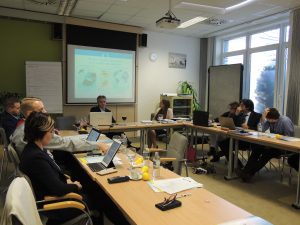IMRO invited to moderate first policy workshop held by SYMBI project
 IMRO-DDKK has been invited to participate in the first policy workshop held in the frame of the Interreg Europe-funded SYMBI project gathering 9 partners from seven EU countries (Spain, Italy, Finland, Poland, Slovenia, Greece and Hungary) with the aim of improving the implementation of regional development policies and programmes related to the promotion and dissemination of Industrial Symbiosis and Circular Economy.
IMRO-DDKK has been invited to participate in the first policy workshop held in the frame of the Interreg Europe-funded SYMBI project gathering 9 partners from seven EU countries (Spain, Italy, Finland, Poland, Slovenia, Greece and Hungary) with the aim of improving the implementation of regional development policies and programmes related to the promotion and dissemination of Industrial Symbiosis and Circular Economy.
The five-year project seeks to support the transition towards a resource-efficient economy through industrial symbiosis, establishing territorial synergies to manage waste and exchange energy & by-products as secondary raw resources. To do so, a number of experience sharing activities will take place between involved regional authorities and stakeholders.
The main objective of the workshop was to discuss about topics highly relevant for the project’s purposes including:
- Challenges a barriers hindering the adoption of circular economy business practices
- The European strategy (action plan) for circular economy
- Removing barriers and building incentives to stimulate private sector investments
As for key conclusions of the workshop, participants concluded that most important barriers in adoption of circular economy and industrial symbiosis include the lack of information about benefits, high levels of bureaucracy, lack of proper infrastructure and lack of awareness. On the other hand, actions as increased investments in R&D, building trust, stimulating cooperation amongst key economic actors and boosting green public procurement are considered to be main enabling factors. Also some best practices have been mentioned during the workshop such as METANOGENIA from Spain, INLATE from Italy or rice production.
Participants also debated current EU policy instruments intended for encouraging private sector investments in circular economy such as the EU’s Circular Economy Package, the Roadmap to a Resource Efficient Europe or Europe’s Bioeconomy Strategy and possible barriers in the adoption of these instruments on regional levels (restrictive national legislations, uncertainties related to implementation, etc.). Amongst key financial instruments created to support circular economy and industrial symbiosis projects mention has been made to the Investment Plan for Europe or Horizon 2020.
The one-and-a-half-day workshop has been concluded with a short discussion on current financial instruments and their impact in Hungary.
Participation in the SYMBI workshop has been highly constructive for our colleagues since we were able to get a quick insight in current best practices and challenges in the fields of circular economy and industrial symbiosis besides having the possibility to widen our network with experts.
